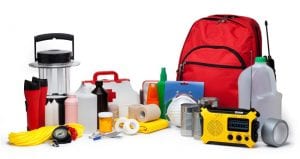When disaster strikes, it’s not easy to decide whether to bug out or bug in. Many people see bugging out as an awesome outdoors adventure. Others even look forward to the prospect, but let’s consider a few things first.
Bugging out means you are venturing into the unknown, abandoning your house, and possibly running into serious, life-threatening danger.
This should never be your plan A. Instead, think of it as a last resort. Though it may sound cool to imagine, in reality, no one wants to find themselves in a scenario like this.
Given the uncertainty of our world today, however, more and more people are choosing to prepare themselves in case an emergency pops up. This could be a natural disaster, financial collapse, or just a sudden outbreak of political riots.
What does it Mean to Bug Out?
To bug out means to leave immediately. And most people who are choosing to get ready for a possible bug-out situation are not paranoid freaks, but people who want to keep themselves and their families safe no matter what. They are willing to prepare for a survival bug out scenario, even if it means a risky path. Sometimes, there just isn’t another option.
A good example of a dangerous bug-out route was that of the Syrian refugees fleeing to Europe. They didn’t have much of a choice about whether to bug out or bug in and had to leave home.
This was an exceptionally long bug out that involved fleeing their home city into the unknown. Then they had to pay someone to take them on a boat to the edge of Europe, making their way through Europe in hopes of a better life. In many cases, the refugees didn’t bring enough food, water, or money to last very long.
Image via Snopes.com
This is a good example of why learning how to fish, hunt, and forage prior to bugging out is so important. The first rule of bugging out is to eat only what can fit in your bag without weighing you down too much. The next involves finding your food and preparing it properly to avoid diseases.
Acquiring Outdoor Skills
What other skills will you need to master before considering a bug-out plan? Know-how for building a shelter is crucial in your repertoire of skills, as is knowing how to start a fire. You will also need to learn about water filtration, as water is too heavy to carry much of. As you can see, there’s a lot to worry about when you bug out.
Planning Ahead
The next thing you must consider when deciding to bug out or bug in is setting up your bug out location. That will involve investing in land or deciding on a survival retreat for safety. You might also consider teaming up with friends who have a cabin in a remote location.
Once you choose a bug out location, you may need to split your supplies between this place and your home in case you decide to bug in. You can’t know ahead of time where you’ll be when a disaster breaks out, so this is important.
How does this Compare to Bug-In Situations?
So, should you bug out or bug in? When you are bugging in, it technically only involves staying inside your residence and keeping it protected.
This means you have to have enough water and food to survive, even if the water gets shut off. Ideally, you’ll have enough water and food to last you some months (or years, depending on how serious you want to get).
Image via Pinterest.com
Bugging out, on the other hand, is much harder to prepare yourself for, which is why it should only be your choice in a situation where you have no other options.
Many disaster preppers will prefer to bug in because it requires fewer skills. And the skills needed for bugging out can be very difficult to master. They may also prefer this scenario because they are out of shape and bugging out requires exceptional stamina and strength.
You Never Know What the Future Holds
The bottom line is that being set on either bugging out or bugging in ahead of time doesn’t make sense. You can’t know what your survivalist situation will look like ahead of time.
Although planning ahead and making the choice that seems easier appears to make sense, no one can predict how disaster will unfold if and when it does strike their area. What’s the solution, then? Knowing how to make the right choice, and knowing how to recognize when to bug out or bug in.
Bug Out or Bug In? Make the Right Choice
You have two choices when you’re in a survivalist situation. Staying put or heading out. With the economic tension, terrorism, and political chaos around the world in recent times, the question of which is best is becoming more important.
If you’re a survivalist, knowing which to choose is probably at the top of your list or priorities. But unfortunately, there’s no one-size-fits-all answer to that question. No two survivalist situations are the same. Your best bet, then, is to know some general guidelines for choosing in the moment. That’s what this article will walk you through.
Factors to Consider When Choosing to Bug Out or Bug In
Regardless of what kind of disaster you’re dealing with, the choice to either bug out or bug in will be based on a few different factors. Before choosing what to do, consider the following:
Where You are
Choosing whether to bug out or bug in will be dependent on your location. Whether you live in the suburbs or the city, you might only choose to bug in if you have stocked up enough supplies for the task. If you live on a main street, your house could be a target for looters, which you’ll have to think about.
If you haven’t stocked up on essential survival items, bugging out may be necessary if your location has been affected severely by a disaster. In addition, you’ll have to think about transportation, power, and your water supply for bugging out as all of these will impact the safety of your journey.
Image via Realtor.com
Your Family Members
For most of us, our family is the most important consideration when disaster strikes. You might have a baby or a pregnant wife, in which case you might have no choice but to bug in. Bugging out could be dangerous for them or prevent you from reaching your bug out location.
On the other hand, you may have children who are old enough to travel with you to your bug out location. In this case, you’ll have to consider the length of time it will take to reach your bug out location. Always make sure you practice bug out drills with your family before disaster hits.
Present Danger
The crisis you’re facing, and whether or not it involves a serious threat, will be the most important factor for choosing to either bug out or bug in. If you’re looking at a civil war or economic collapse, think about how intense it is and the different ways it could escalate.
If you are paying close attention and notice danger increasing, this could be a sign it’s time to bug out. Next, think about the weather in your area. Bugging out will obviously be a much more viable situation in June rather than the dead of Winter when it’s snowing outside.
Before you choose to leave the safety of your home, make sure you have the necessary weapons and equipment to defend yourself. If you don’t have the tools needed for this task, you will have to bug in.
Your Personal Fitness
The outdoors can be rough, so being in good shape is necessary for bugging out. If you aren’t physically fit, you may need to stay at home instead of heading out. Are you unsure of your present level of fitness?
Find some ways to test your strength, so you know where you stand. Then, work on getting stronger if necessary.
You might think bugging out is the smartest choice until food and water start running low. But living outdoors isn’t easy to do and requires some survival skills and physical endurance. A typical bug-out route will involve lots and lots of walking.
If you know that you’re in good shape and have already mastered the survival skills necessary, you can choose to bug out. If you haven’t, however, you should probably just stay home.
Image via Enduranceplanet.com
Your Bug Out Location
In case crisis strikes, you should be ready and have your bug out location all planned out. You must know where you’re going, the route you’ll take to get there, and what you’ll bring with you in your bug out bag.
If disaster strikes and you haven’t yet set a bug out location, or learned the skills necessary for wilderness survival, bugging out is probably a bad idea.
In addition, if your home is safe enough to offer you protection from outside danger and you have enough supplies to hold you over for at least a few weeks, bugging in is best.
Reasons Not to Bug Out
Again, bugging out should be your absolute last resort. But just to reiterate this point, let’s go over some reasons why bugging in is usually a better option in a disaster scenario.
You May get Injured
In the unfortunate event of an injury, you will want to be somewhere safe instead of in a tent. Even with a quality first aid kit, all the ointments you can fit in your bug out bag, and basic injury treatment knowledge, being indoors is always better if you get hurt.
If you don’t believe me, just imagine breaking an arm once disaster has struck and you’re off the grid. Would you prefer to be in the woods or at your house?
Being Cold can be Dangerous
The average human likes to keep their apartment or house between 68 and 72 degrees Fahrenheit when it’s cold outside. Keep in mind that you cannot adjust the temperature outside. You’ll have no choice but to deal with whatever the weather throws at you while bugging out.
Sure, you can pile on the layers or start a fire to stay warm, but even then, being cold for a prolonged period can be a miserable experience. When deciding whether you should bug out or bug in, in the colder months, that’s something to keep in mind.
Image via LifehealthyOSU.com
Unpredictable Conditions
Consider also that you might not always be able to start a fire if conditions are damp. Staying inside gives you distinct advantages over bugging out into the wilderness, even if you have no power.
If you choose to stay at home, sealing some rooms up and lighting candles can generate heat and at least you’ll be indoors out of the rain or snow.
You Could be Choosing a Worse Situation
The most common mistake most bug out adventurers make is leaving their home without having a destination planned out ahead of time. The first question you should ask yourself is where you’ll head if you do have to bug out. If your answer is “I don’t know,” you better stay put.
And even if you do have somewhere in mind, review whether it’s the best option. A nearby wildlife reserve may not be the best choice, for example, as it may be the first place that other evacuees or people bugging out choose to go. This means you’ll be competing for resources and trying to stay hidden from unfriendly strangers. And this will be on top of having to worry about staying warm. A good bug out plan should be something you constantly review and revise.
Being a Stranger can be Dangerous
If there’s anything that the news teaches us these days, it’s that people aren’t always easy to trust. You may even have suspicious feelings when you see someone you don’t recognize walking in your neighborhood.
Your mind might immediately go on high alert, wondering if they are a threat or thinking about robbing someone.
If you have to choose whether to bug out or bug in and you decide to leave, you will be the stranger that everyone else is suspicious of. Not only that, but you will be considered a competitor to many people trying to do the same thing you’re doing.
Being surrounded by desperate people has a lot of potential to get dangerous or downright life-threatening. Think about staying home with your community and start forging bonds with your neighbors now.
You’ll be More Visible
The best reason to bug in instead of bugging out is being hidden from the view of would-be attackers. When you bug out, you’re heading out into the unknown and can’t know what conditions to expect.
Staying at home, however, means you can band together with your neighbors. You can work together to keep an eye on what’s going on around your area. You’ll already know the land and have the advantage of a better defense from indoors.
Image via Techcoachalbert.com
You’d be Leaving Your Community
You already have a community around you, even if you aren’t aware of it or don’t think of it that way. When crisis strikes, the community bands together to help each other out.
Since problems in infrastructure can contribute to tension and stress all around, as it did with the recent power outages in Puerto Rico, help from those around you is a valuable resource.
Maybe you think of your tiny neighborhood as its own community. But even people who don’t get along very well will likely pull together if there’s a severe emergency going on. On the other hand, there’s a chance your neighbors could do the opposite and turn on you.
If this does happen, you will need to think quick on your feet and adjust your plan. In most cases, however, you will probably be surprised by the ones around you when crisis strikes. And you can start forging stronger relationships with them now, before you’re in a life-or-death emergency.
It’s Tough to Carry a Heavy Load
Have you ever walked for multiple days carrying pounds and pounds of gear and supplies on your back? This, in addition to your self-defense supplies, food, and more could add up to more than you think.
Although you can start by making your bag as light as possible, it’s still going to be quite a load. Yes, it could get lighter as you use your supplies, but then you’re facing a new issue of running out of important survival items!
Depending on the survival situation you’re facing, you might not be able to stop by a store and grab what’s needed. These are just a few more good reasons why bugging out should be a last resort over staying at home.
You have Everything You Need at Home
Yes, this one sounds obvious, but simplicity is the best approach to a situation regarding your survival. If you’ve been prepping for long, you likely already have some supplies stocked up to get you through a few different emergency situations.
You might even have an entire basement full of items you’ll need in case society crumbles. Even if you’ve only prepared to survive for a week at home, that’s substantial. And if you’ve been preparing in this way, you have likely organized your items in a way that makes them easy to get to and keeps them safe.
Easy Access to Essentials
If you choose to stay at home, your survival items don’t need to be carried on your back or, even worse, left behind because you can’t spare the weight. You have what you need right where you need it.
Bugging out will mean you have to carefully select what you’ll need out in the wilderness. And it’s hard to know what this will be ahead of time if you aren’t psychic.
Image via Wunderground.com
Your Living Room Floor is Better than the Woods
Sure, you may be one of those people who loves hiking and doesn’t have a problem falling asleep outside. But your bed is going to be much more comfortable than the forest floor, hammock in the woods, or an abandoned building.
Think about this. Even sleeping on your floor at home is going to be preferred over braving the elements, if your home is still livable.
Sleep is Crucial for Survival
Getting enough sleep is very important in a survivalist situation and your health depends on it. Your immune system and alertness will suffer if you aren’t sleeping well. This can be a bad combination when you’re out in the wild already fighting to survive.
When disaster strikes, you’ll be facing new stresses that you can’t possibly predict, on top of choosing initially whether to bug out or bug in. You will be exhausted and happy you have a comfortable, protected home to rest in instead of roughing it in the woods.
What Will Your Plan be?
So, will you bug out or bug in? Keep in mind that staying at home won’t automatically guarantee your safety, either. Every situation is different and you must decide what’s best for your situation and family when and if the time comes.
Of course, if your home is at risk of burning down or getting completely flooded, you won’t be able to stay home. This is something to consider that could help you come up with a different plan for each type of disaster.
When it comes down to it, the choice to either bug out or bug in depends on you. You’ll need to perceive and assess your situation as soon as you can and make a choice in a short time.
The best thing you can do for yourself (and any family members that will be affected by a disaster like this) is to think ahead. Have a plan for any crisis that could potentially pop up.
Conclusion
This article may have sounded as though I think bugging out is never a good idea, but that’s not true. It can be the best choice in certain circumstances. No matter what happens, keep your cool and don’t panic. Getting into a panicked frame of mind will make choosing what to do much harder.
Instead, stay calm and scrutinize your situation as it unfolds. Be prepared for both bugging out and bugging in. Even though bugging out should always be your last resort, don’t neglect to make a plan that covers that scenario.







